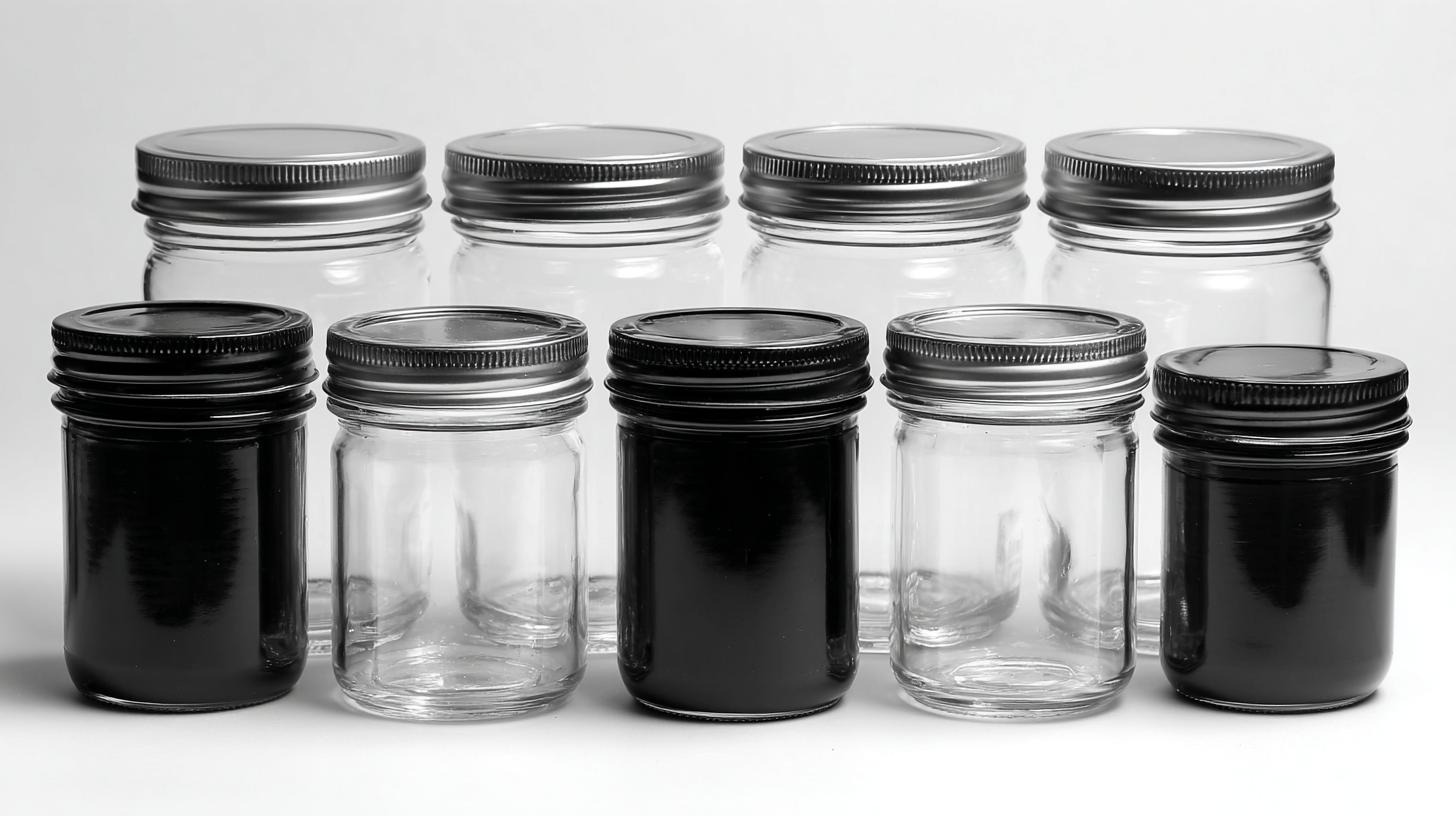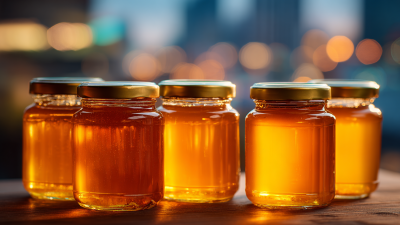Why Plastic Jars with Lids are the Best Choice for Food Storage According to Industry Experts
In today’s fast-paced world, the need for efficient food storage solutions has never been more critical. According to industry experts, plastic jars with lids have emerged as one of the top contenders in this arena, offering a perfect blend of convenience, durability, and safety. A recent market analysis by the Food Storage Association indicated that over 65% of households now prefer plastic containers for their food preservation needs, citing ease of use and lightweight properties as key advantages.

Moreover, plastic jars with lids have been shown to provide superior airtight seals compared to glass alternatives, effectively minimizing moisture and prolonging the freshness of various food items. According to a report from the Packaging Institute, food stored in sealed plastic jars can last up to 50% longer than those kept in traditional containers. This statistic underscores the importance of choosing the right storage medium and highlights why plastic jars with lids are becoming increasingly favored by both consumers and food industry professionals alike. With their versatility, convenience, and effective preservation capabilities, it’s clear that plastic jars with lids are revolutionizing food storage solutions for modern households.
Benefits of Plastic Jars with Lids for Food Storage in 2025
In 2025, plastic jars with lids stand out as the optimal choice for food storage, promising convenience and efficiency for consumers. One of the primary benefits of these jars is their lightweight design, making them easy to handle and transport. Unlike glass containers, plastic jars are less prone to breaking, which enhances safety in homes with children or active kitchens. This durability, combined with an airtight seal provided by their lids, ensures that food remains fresh for longer periods while minimizing spoilage and waste.
Additionally, the versatility of plastic jars makes them suitable for a wide range of food items, from dry goods like grains and snacks to liquids such as sauces and dressings. Their transparent design allows users to quickly identify contents, streamlining meal prep and organization in the kitchen. Furthermore, with advancements in sustainable materials, many plastic jars are now made from recyclable or biodegradable components, aligning with the growing demand for eco-friendly practices among consumers. This shift not only benefits the environment but also offers peace of mind for those seeking to minimize their carbon footprint while enjoying the practical advantages of plastic storage solutions.
Why Plastic Jars with Lids are the Best Choice for Food Storage According to Industry Experts - Benefits of Plastic Jars with Lids for Food Storage in 2025
| Benefit | Description | Expert Opinion | Sustainability Rating |
|---|---|---|---|
| Durability | Plastic jars are resistant to shattering and breaking, making them ideal for food storage. | Experts highlight that their strength reduces food waste due to spoilage from damaged containers. | 4.5/5 |
| Lightweight | Easier to handle than glass jars, they streamline food storage and transportation. | Industry professionals believe lighter jars contribute to reduced shipping costs. | 4/5 |
| Versatile Sizes | Available in various sizes suitable for different food items, from snacks to bulk grains. | Experts recommend this feature for customizable storage solutions. | 5/5 |
| BPA-Free Options | Many plastic jars are now made without harmful chemicals, ensuring food safety. | Experts advocate for BPA-free storage to protect consumer health. | 4.8/5 |
| Recyclable Materials | Many plastic jars are made from recyclable materials, helping reduce waste. | Experts emphasize the importance of materials that support a circular economy. | 4.6/5 |
Comparative Analysis: Plastic Jars vs. Other Storage Options
When it comes to food storage, the choice of containers is crucial for maintaining freshness and safety. Plastic jars with lids offer several advantages over other storage options like glass, metal, or cardboard. Firstly, plastic jars are lightweight and shatter-resistant, making them an ideal choice for households with children or for on-the-go storage. Unlike glass, which can break and create hazards, plastic jars provide a safer alternative, especially in busy kitchens.
Moreover, plastic jars are often more cost-effective than their glass or metal counterparts. Their affordability allows consumers to purchase multiple containers without breaking the bank, facilitating better organization of food items. When comparing plastic to cardboard, which is prone to moisture damage and pest attraction, plastic jars excel in durability and protection from external elements. This comparative analysis highlights that, while traditional options have their benefits, plastic jars with lids emerge as a superior choice for practical, safe, and economical food storage solutions.

Key Features to Look for in Plastic Food Storage Jars
When selecting plastic jars with lids for food storage, certain key features should be prioritized to ensure quality and functionality. First and foremost, look for airtight seals. A jar with a tight-fitting lid will keep moisture and air out, preserving the freshness of the contents and extending shelf life. This is particularly important for items like grains, snacks, and leftovers that are sensitive to environmental factors.
Another critical feature is the material of the jar itself. High-density polyethylene (HDPE) and polycarbonate are excellent options as they are sturdy, durable, and resistant to impact. It's also essential to consider BPA-free options to ensure food safety.
Translucent designs can be beneficial, allowing you to easily see the contents without opening the jar, thus maintaining the seal. Additionally, consider jars that are easy to stack or store, as this can save valuable kitchen space while keeping your food organized and accessible.
Industry Expert Recommendations on Choosing the Right Jar
When it comes to food storage, industry experts agree that plastic jars with lids provide an optimal solution. These containers are lightweight, durable, and versatile, making them a fantastic choice for preserving everything from grains to homemade sauces. When selecting the right jar, considerations such as the material's safety, the size of the jar, and the type of lid are essential factors.
**Tips for Choosing the Right Jar:** First, opt for BPA-free plastic to ensure your food remains safe from harmful chemicals. Additionally, consider transparent jars that allow easy visibility of contents, helping you keep track of what you have. Finally, choose jars with airtight lids to maintain freshness and prevent contamination, especially for items like dry goods and snacks.
It’s also important to think about the jar size. A larger jar might be suitable for bulk items, while smaller jars are perfect for spices or snacks. By choosing the right sizes, you can maximize your storage efficiency. Following these expert recommendations will help ensure that your food storage is practical and safe, making the most of your kitchen space.
Why Plastic Jars with Lids are the Best Choice for Food Storage
This chart illustrates the advantages of using plastic jars with lids for food storage as recognized by industry experts. The data reflects the most important factors influencing their recommendation.
Sustainability and Safety Considerations for Plastic Food Storage
 When it comes to food storage, sustainability and safety are top priorities for consumers and industry experts alike. According to a 2022 report from the Food Packaging Institute, plastic jars with lids are increasingly favored due to their recyclability and reduced carbon footprint compared to glass alternatives. These jars are not only lightweight but also require less energy during production and transport, leading to lower greenhouse gas emissions.
When it comes to food storage, sustainability and safety are top priorities for consumers and industry experts alike. According to a 2022 report from the Food Packaging Institute, plastic jars with lids are increasingly favored due to their recyclability and reduced carbon footprint compared to glass alternatives. These jars are not only lightweight but also require less energy during production and transport, leading to lower greenhouse gas emissions.
In terms of safety, plastic containers have come a long way. Recent advancements in food-grade plastics ensure that harmful chemicals like BPA are eliminated, making them safe for storing food items. The FDA confirms that many modern plastics meet stringent safety standards, reducing the risk of contamination. Additionally, plastic jars provide a tight seal that helps maintain freshness, preventing spoilage and food waste—a critical point for environmentally conscious consumers.
Tip: Always check for BPA-free labels when purchasing plastic jars, as these are safer for food storage.
Tip: Look for containers that are labeled as recyclable; this ensures that your choice contributes to a circular economy.
Tip: Consider jars with airtight lids to keep your food fresher for longer, which not only saves money but is also better for the planet.
Related Posts
-

The Ultimate Guide to Choosing the Best Plastic Jars with Lids for Every Storage Need
-

Innovative Designs in Cosmetic Containers Elevating Your Beauty Brand Aesthetic
-

The Sweet Science Behind Honey Bottles: Exploring Storage, Benefits, and Bee-Friendly Practices
-

The Rise of Honey Jars in Sustainable Packaging Trends and Consumer Preferences
-

The Untold Secrets Behind Recycling Plastic Bottles for a Sustainable Future
-

Exploring Sustainable Innovations in Container and Packaging Supply for a Greener Future
